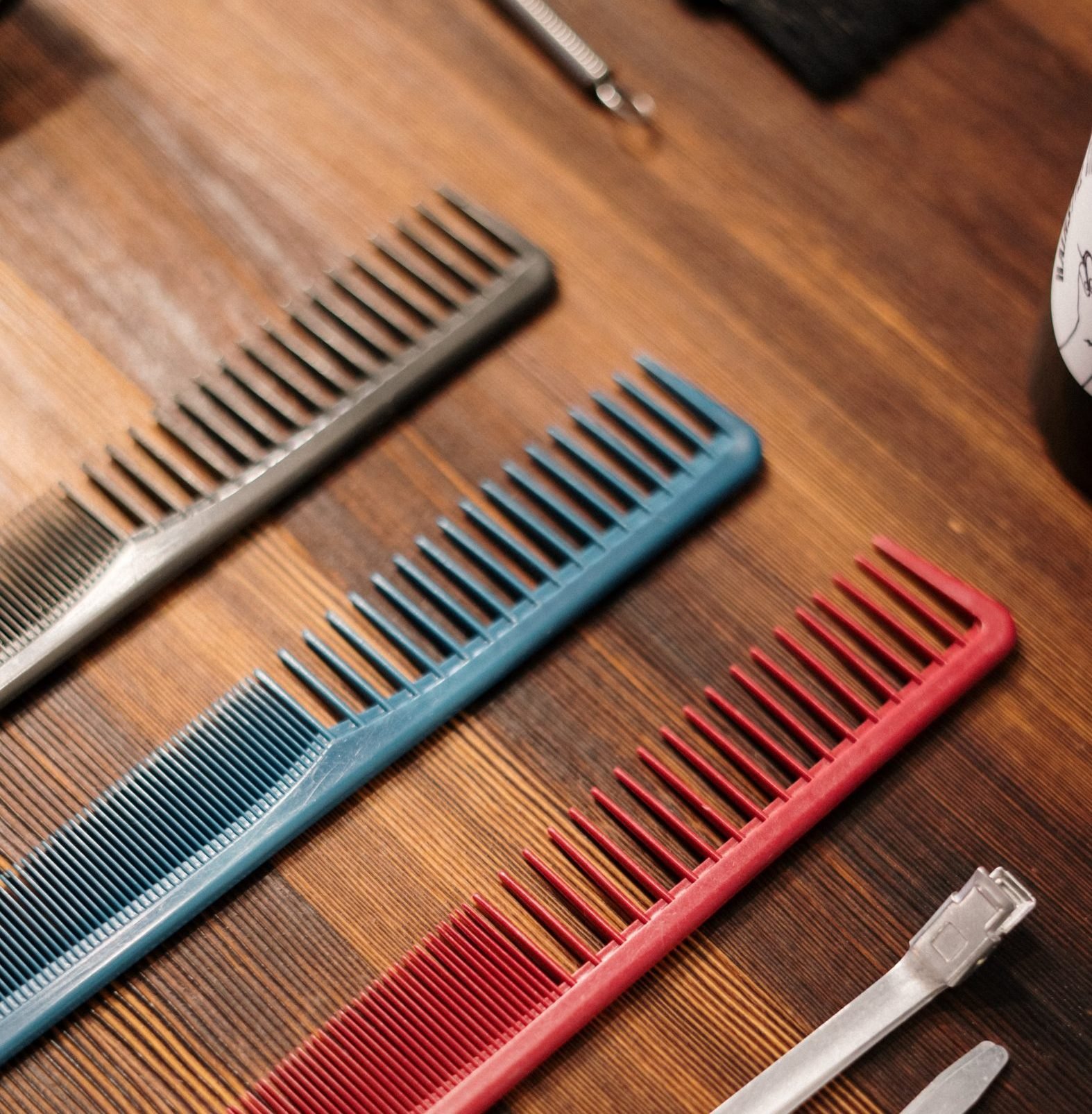Combing hair is highly recommended and has many benefits, i.e., ‘One who passes the comb upon his head and his heart and his chest, seven times, no disease will come near him for ever and attracts the sustenance, and improves the hair, and fulfils the need, and increases in water of the loins, and cuts the phlegm.
مكا، مكارم الأخلاق عَنْ يَحْيَى بْنِ حَمَّادٍ عَنْ سُلَيْمَانَ بْنِ يَحْيَى قَالَ: تَلَبَّسَ الرِّضَا ع يَوْماً لِلرُّكُوبِ إِلَى بَابِ الْمَأْمُونِ وَ كُنْتُ فِي حَرَسِهِ فَدَعَا بِالْمُشْطِ وَ جَعَلَ يَمْشُطُ ثُمَّ قَالَ يَا سُلَيْمَانُ أَخْبَرَنِي أَبِي عَنْ أَبِيهِ عَنْ آبَائِهِ عَنْ رَسُولِ اللَّهِ ص أَنَّهُ قَالَ مَنْ أَمَرَّ الْمُشْطَ عَلَى رَأْسِهِ وَ لِحْيَتِهِ وَ صَدْرِهِ سَبْعَ مَرَّاتٍ لَمْ يُقَارِبْهُ دَاءٌ أَبَداً.
(The book) ‘Makarim Al Akhlaq’ – from Yahya Bin Hammad, from Suleyman Bin Yahya who said,
‘One day Al-Reza-asws wore garments for the riding to the door of Al-Mamoun, and I was his‑asws guard. He-asws called for the comb and went on to comb, then said: ‘O Suleyman! My-asws father-asws informed me-asws, from his-asws father-asws, from his-asws forefathers-asws, from Rasool-Allah-saww having said: ‘One who passes the comb upon his head and his heart and his chest, seven times, no disease will come near him for ever!’’[1]
وَ رُوِيَ أَنَّهُ قَالَ: إِذَا سَرَّحْتَ لِحْيَتَكَ فَاضْرِبْ بِالْمُشْطِ مِنْ تَحْتُ إِلَى فَوْقُ أَرْبَعِينَ مَرَّةً وَ اقْرَأْ إِنَّا أَنْزَلْناهُ فِي لَيْلَةِ الْقَدْرِ وَ مِنْ فَوْقُ إِلَى تَحْتُ سَبْعَ مَرَّاتٍ وَ اقْرَأْ وَ الْعادِياتِ ضَبْحاً ثُمَّ قُلِ اللَّهُمَّ سَرِّحْ عَنِّي الْهُمُومَ وَ الْغُمُومَ وَ وَحْشَةَ الصُّدُورِ وَ وَسْوَسَةَ الشَّيْطَانِ.
And it is reported, he-asws said: ‘When you comb your beard, strike with the comb from below to above forty times, and recite: Surely We Revealed it during the Night of Pre-determination [97:1] (Surah Al-Qadr), and from above to below, seven times, and recite: (I Swear) by the running (steeds) snorting [100:1] (Surah Al Adiyaat), then say, ‘Release away from me the worries, and the sadness, and loneliness of the chests, and the insinuations of Satan-la’’.[2]
مكا، مكارم الأخلاق كَانَ النَّبِيُّ ص يَتَمَشَّطُ وَ يُرَجِّلُ رَأْسَهُ بِالْمِدْرَى وَ تُرَجِّلُهُ نِسَاؤُهُ وَ تَتَفَقَّدُ نِسَاؤُهُ تَسْرِيحَهُ إِذَا سَرَّحَ رَأْسَهُ وَ لِحْيَتَهُ فَيَأْخُذْنَ الْمُشَاطَةَ فَيُقَالُ إِنَّ الشَّعْرَ الَّذِي فِي أَيْدِي النَّاسِ مِنْ تِلْكَ الْمُشَاطَاتِ
(The book) ‘Makarim Al Aklhaq’ –
‘The Prophet-saww used to comb and tie (hair of) his-saww head with the bandanna, and his-saww wives would tie it, and his-saww wives would miss his-saww comb when he-saww combed his-saww head and his-saww beard, so they would take the comb. It is said that the hair which is in the hands of the people is from that comb.
فَأَمَّا مَا حَلَقَ فِي حَجَّتِهِ وَ عُمْرَتِهِ فَإِنَّ جَبْرَئِيلَ كَانَ يَنْزِلُ فَيَأْخُذُهُ فَيَعْرُجُ بِهِ إِلَى السَّمَاءِ وَ لَرُبَّمَا سَرَّحَ لِحْيَتَهُ فِي الْيَوْمِ مَرَّتَيْنِ
As for his-saww having shaved during his-saww Hajj and his-saww Umrah, Jibraeel-as would descend and take it and ascend with it to the sky, and sometimes he-saww would comb his-saww beard twice during the day.
وَ كَانَ ص يَضَعُ الْمُشْطَ تَحْتَ وَسَادَتِهِ إِذَا امْتَشَطَ بِهِ وَ يَقُولُ إِنَّ الْمَشْطَ يَذْهَبُ بِالْوَبَاءِ وَ كَانَ ص يُسَرِّحُ تَحْتَ لِحْيَتِهِ أَرْبَعِينَ مَرَّةً وَ مِنْ فَوْقِهَا سَبْعَ مَرَّاتٍ وَ يَقُولُ إِنَّهُ يَزِيدُ فِي الذِّهْنِ وَ يَقْطَعُ الْبَلْغَمَ.
And he-saww would place the comb under his-saww pillow when he-saww had combed with it, and he-saww said: ‘The combing does away with the plague’; and he-saww would comb under his-saww beard forty times, and from above it seven times, and he-saww said: ‘It increases in the mind and cuts the phlegm’’.[3]
وَ فِي رِوَايَةٍ عَنِ النَّبِيِّ ص أَنَّهُ قَالَ: مَنْ أَمَرَّ الْمُشْطَ عَلَى رَأْسِهِ وَ لِحْيَتِهِ وَ صَدْرِهِ سَبْعَ مَرَّاتٍ لَمْ يُقَارِبْهُ دَاءٌ أَبَداً.
And in a report from the Prophet-saww having said: ‘One who passes the comb upon his head and his beard and his chest, seven times, no diseased will come near him, ever!’’[4]
مِنْ رَوْضَةِ الْوَاعِظِينَ وَ كَانَ رَسُولُ اللَّهِ ص يُسَرِّحُ تَحْتَ لِحْيَتِهِ أَرْبَعِينَ مَرَّةً وَ مِنْ فَوْقِهَا سَبْعَ مَرَّاتٍ وَ يَقُولُ إِنَّهُ يَزِيدُ فِي الذِّهْنِ وَ يَقْطَعُ الْبَلْغَمَ.
From (the book) ‘Rowzat Al Waizeen’ –
‘And Rasool-Allah-saww would comb below his-saww beard forty times, and from above it seven times, and he-saww said: ‘It increases in the mind and cuts the phlegm’’.[5]
الخصال عَنْ إِسْمَاعِيلَ بْنِ مَنْصُورِ بْنِ أَحْمَدَ الْقَصَّارِ عَنْ مُحَمَّدِ بْنِ الْقَاسِمِ بْنِ مُحَمَّدٍ الْعَلَوِيِّ عَنْ أَحْمَدَ بْنِ عَلِيٍّ الْأَنْصَارِيِّ عَنِ الْبَرْقِيِّ عَنِ ابْنِ فَضَّالٍ عَنْ ثَعْلَبَةَ عَنْ عَبْدِ الرَّحْمَنِ بْنِ الْحَجَّاجِ عَنْ أَبِي عَبْدِ اللَّهِ ع فِيقَوْلِ اللَّهِ عَزَّ وَ جَلَ خُذُوا زِينَتَكُمْ عِنْدَ كُلِّ مَسْجِدٍ
(The book) ‘Al Khisaal’ – from Ismail Bin Mansour Bin Ahmad Al Qasr, from Muhammad Bin Al Qasim Bin Muhammad Al Alawy, from Ahmad Bin Ali Al Ansari, from Al Barqy, from Ibn Fazzal, from Sa’alba, from Abdul Rahman Bin Al Hajjaj,
‘From Abu Abdullah-asws regarding Words of Allah-azwj Mighty and Majestic: Take to your adornments at every Masjid, [7:31].
قَالَ الْمَشْطُ يَجْلِبُ الرِّزْقَ وَ يُحَسِّنُ الشَّعْرَ وَ يُنْجِزُ الْحَاجَةَ وَ يَزِيدُ فِي مَاءِ الصُّلْبِ وَ يَقْطَعُ الْبَلْغَمَ وَ كَانَ رَسُولُ اللَّهِ ص يُسَرِّحُ تَحْتَ لِحْيَتِهِ أَرْبَعِينَ مَرَّةً وَ مِنْ فَوْقِهَا سَبْعَ مَرَّاتٍ وَ يَقُولُ إِنَّهُ يَزِيدُ فِي الذِّهْنِ وَ يَقْطَعُ الْبَلْغَمَ.
He-asws said: ‘The combing attracts the sustenance, and improves the hair, and fulfils the need, and increases in water of the loins, and cuts the phlegm, and Rasool-Allah-saww used to comb under his-saww beard forty times, and seven times from above it, and he-saww said: ‘It increases in the mind and cuts the phlegm’’.[6]
[1] Bihar Al-Anwaar V 73 – The book of Etiquettes – Ch 14 H 2 /1
[2] Bihar Al-Anwaar V 73 – The book of Etiquettes – Ch 14 H 2 / 5
[3] Bihar Al-Anwaar V 73 – The book of Etiquettes – Ch 15 H 3 a
[4] Bihar Al-Anwaar V 73 – The book of Etiquettes – Ch 15 H 3 b
[5] Bihar Al-Anwaar V 73 – The book of Etiquettes – Ch 15 H 4 / 5
[6] Bihar Al-Anwaar V 73 – The book of Etiquettes – Ch 15 H 6
